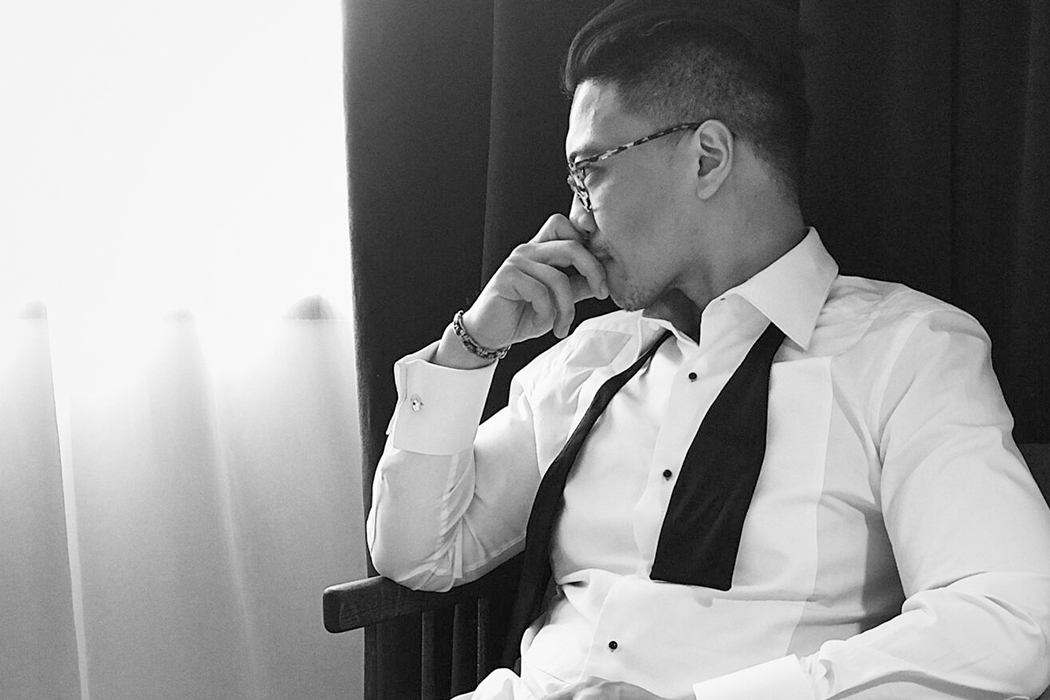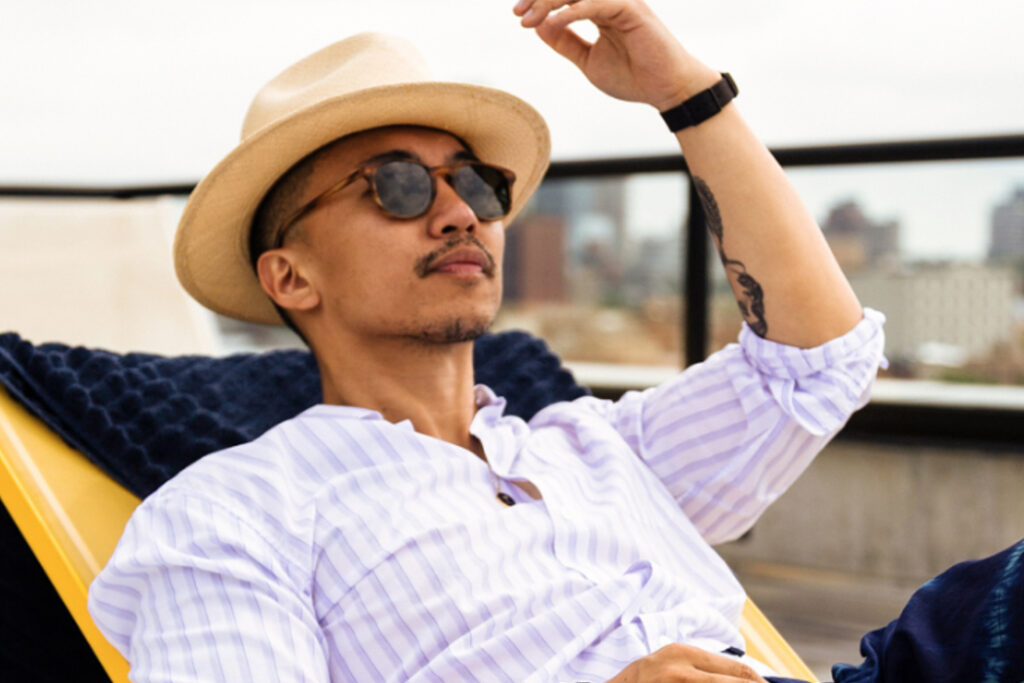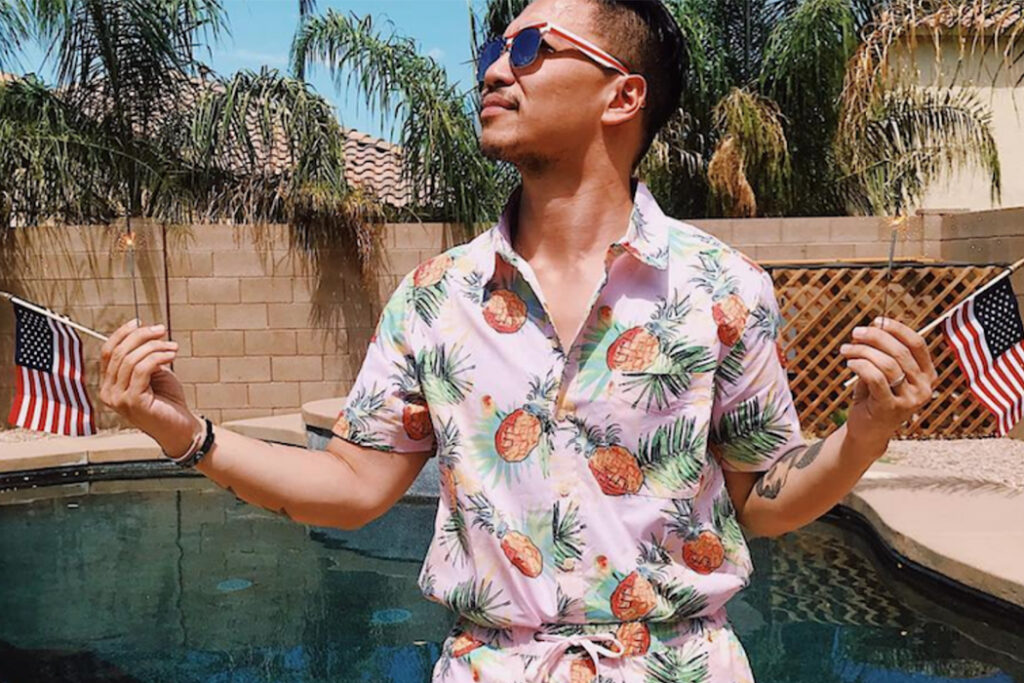Men's Personal Stylist Peter Nguyen

As generations new and old take a closer look at the embedded culture of toxic masculinity, many men are feeling less pressure to adhere to the former rigid social expectations of what it means to be a man in modern day society. The [now] laughable term, “Metrosexual,” a word used to describe a growing number of men who participate in a more “feminine” version of self-care practices, gained popularity in the onset of the 2000s. Nearly two decades later, wanting to look after yourself and dress to feel good is no longer the punch-line of comedy or a jab at womenfolk. We sat down with Peter Nguyen, whose career is based on helping men discover their own personal style and welcome them into a bold new world of dressing for success and exploring self-love through skincare.
SO: Sasha Owen
PN: Peter Nguyen
SO: Can you tell us a bit about yourself and what it is you do?
PN: My name's Peter Nguyen. I live in NYC and am a Private Personal Stylist for men. I also write and run a related men's style blog called The Essential Man.
SO: How did you get started in your current profession?
PN: Before personal styling, I worked as a menswear designer here in NYC. I specialized in leather, and had my own leather jacket company for a while alongside ghost designing for a few brands. After spending a decade doing that, I wanted a change of pace, and a mentor suggested I look into services instead of creating physical products. That's when I shifted to personal styling along with writing about style on my blog. Four years later I have a handful of clients around the world, and hundreds of thousands of daily readers.

SO: Why did you choose to focus on men who work in the tech industry?
PN: My clientele evolved through the years. In the beginning, I worked with any guy that was looking for help. Over time, I started to see a pattern with the type of clients I enjoyed working with, and a lot of them happened to work in tech. Tech often gets a bad rap when it comes to their style, but I've found with the rise of design-focused companies operating like tech companies (like Warby Parker, Bonobos, Away bags, Everlane) men in tech are paying more attention to aesthetics. The rest of my client base tend to be older, successful men in other industries. I've worked with journalists at the NY Times, as well as entrepreneurs.
SO: Is there anything you think fashion brands miss the mark on when it comes to targeting men?
PN: I find a lot of brands still hold onto outdated concepts and cliches - like men don't care about looking good and hate shopping. So you have companies who focus on providing cheap products or "set it and forget it" subscription boxes that send them a bunch of subpar clothes that make them look like crap. Or they resort to frat boy humor in the copy and marketing and turn away men who want to look professional and successful. Then they wonder why they don't have repeat customers. What I've learned from working with thousands of men one on one over the years is that they will pay a premium for quality, and they enjoy shopping when the clothes they buy actually make them look good, feel successful, and grown.
SO: We’ve talked a bit about men’s skincare in the past, is there any message you’d personally like to send out when it comes to men who are unfamiliar with the skincare world?
PN: Yes! First, a starting routine isn't as complicated as you think. You don't need a sixteen step routine, three products is all you need and it takes me about a couple minutes to do.
Second, the best time to start is in your 20s. The second best time to start is now. Admittedly, I didn't start really taking care of my skin until earlier this year (at the age of 36). I visited my parents over the holidays and realized my father, who people say I look like, was looking particularly older than I remember. He isn't a guy who takes care of his skin, and it scared me straight. I visited Heyday, a skincare spa here in NYC where a specialist set me up with a solid, basic, three step routine. (You can read about my routine here)
It consists of a face wash, toner, and moisturizer/sunblock. That will get most people 95% of the way there. Everything else is a bonus. I recommend all men start here. For products, I love Ursa Major for face wash and toner, and Image Skincare for a moisturizer/sunblock.
SO: Some people feel that men are missing out on the ability to be creative with their look [like women can] due to the limited options in menswear, what advice would you give to a man who was looking to find a fresh or modern approach to dressing?
PN: Having worked in high end fashion for over a decade, I don't believe there are limited options at all. If I learned anything from styling over the last four years, is that the style advice out there is confusing or non-existent. I'm not surprised men aren't sure how to approach style or trends.
I always stress the importance of starting with a core, essential style first. Building a wardrobe that leans classic and timeless.
What I tell my clients is to think of it like cooking. You want to learn classic recipes first before adding some flare and personality to it to make it your own.
So for the man who wants to try out trends or develop a modern personal style, start with a classic look, then add one small trend in and see how you like it. For example, floral print shirts have been big for the past few summers. Throw it under a classic, perfectly tailored charcoal grey suit and you have something fresh and modern.
The great thing is if you don't like it or the trend goes out of style, you can pull it back and still have a solid, timeless look. You still got a grey suit you can wear with a pale striped button-down shirt and tie to work.
SO: As we’ve personally discussed before, South Korea is on the forefront when it comes to makeup and skincare products geared towards a male audience, do you feel like that wave is ever going to reach the United States?
PN: I notice it already starting. A lot of my readers email me asking about skincare and grooming products, and the younger generation are more open to trying things that were once labeled "feminine." I think the popularity of Korean music in the U.S., along with male celebrities sharing their interest in style and grooming in magazines like GQ or Youtube are changing men's perceptions on caring about how they look.
SO: Are there any brands you have steadfast trust in?
PN: Lately I'm less interested in what's hot and new. I've learned after working in design that it's extremely difficult to manufacture something, especially when you're new. So I approach many new brands with optimistic caution.
I prefer to invest in brands that have lasting power, especially those that are known for a specific thing. For example, my favorite shoe brand is Crockett & Jones, and english shoe brand that has been around since 1879. Other brands I invest my money into are Dries Van Noten, Ring Jacket (from Japan), and Common Projects. I'm also a big fan of Suit Supply for more accessible suiting, and it's a place I always take my private clients.
SO: Why do you think it’s important for men to have an interest in self-care?
PN: My motto at The Essential Man is: "When you look good, you feel good. And when you feel good, good things happen."
I truly believe in the outside-in effect taking care of one's appearance can have. Who hasn't put on something really nice before a date and felt 100x sexier? Or a perfectly pressed suit before an interview and felt like you were already hired? One surprising thing I've found with all my past clients is that a new wardrobe and haircut has been the catalyst into self improvement. Time and time again, after working on their style, I have men text, email, and DM me asking for recommendations on nicer pens, great books, inspirational movies. Advice on getting into shape, dating, getting therapy, changing careers and making more money.
They realize the world they live in is actually malleable, they can shape it into the life they always dreamed of, and who doesn't want that?

SO: How has your profession affected your own life? Were there any proud moments along the way?
PN: I've developed a huge sense of empathy for people. The important part of any business is understanding your client or customers true pains and desires. I spent months, and still do, talking to my readers and clients about why they want my help, and for many it's heartbreaking. Men who were bullied for being fat and finally got into shape. Men who got out of a loveless marriage and are looking to get back out there. I've even worked with a black client who wanted a more professional look so he wouldn't be racially profiled.
That empathy has leached into all the other areas of my life and I've found that I'm a much more patient, understanding person.
The proudest moment has to be when I got an email from a reader with a photo of him holding a car seat with a baby in it.
He was wearing a fitted t-shirt and jeans, with a nice haircut. In his email, he said this photo was really important to him. It was the first photo of him and his newborn son who had been in the neonatal intensive care unit. He put together a timeless look reading my blog, and was happy that in 20 years he could look back at the photo with pride and not be distracted by some style error.
I ugly cried after reading that for a good 5 minutes.
SO: Anything else you'd like to share with the world?
PN: Nothing other than read my blog www.theessentialman.com and follow me on Instagram @theessentialman if you want some style advice!
Peter donated his fee for this interview to The Trevor Project, an organization bringing awareness to suicide prevention. Thank you Peter!